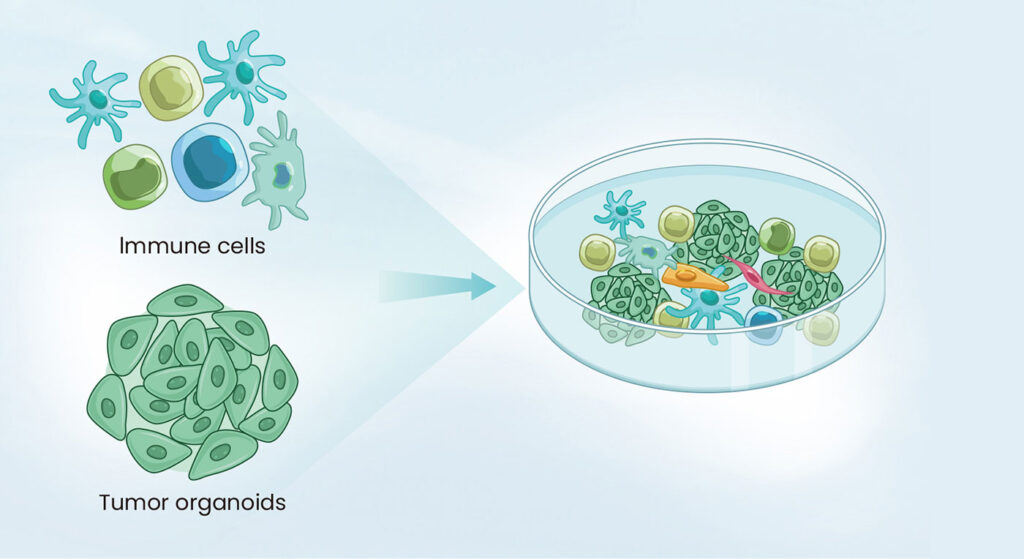Sponsored content brought to you by
Organoids, which are 3D cell cultures derived from stem cells, present new opportunities for personalized cancer treatment and precision medicine. However, the absence of a tumor microenvironment (TME), including immune cells and stromal cells, is a significant limitation of organoid technology. As a result, the development of new strategies for the co-culture of tumor organoids and immune cells is underway, opening new avenues for studying specific cancer therapies. Additionally, co-culture aids in studying cellular interactions in the TME, revealing new therapeutic targets and contributing to the discovery of biomarkers and neoantigens for vaccine development.
Approaches to co-culture models
The current approaches to co-culturing organoids and immune cells involve either the direct addition of immune cells to organoid cultures or the expansion of immune cells in tumoroids explanted from the patient. However, there is no universal medium suitable for both immune cells and organoids. Therefore, it is necessary to conduct precise experiments before co-culture to determine the optimal conditions under which the organoids can proliferate without harming the immune cells. Both the immune cells and organoid cultures need to contain specific cytokines and growth factors. For instance, IL-2, IL-7, IL-15, and IL-21 are essential for immune cell culture, while Wnt3a, EGF, Noggin, and R-spondin-1 form the most classical cytokine scheme in organoid culture.

Applications in cancer therapy
Co-culture models can be utilized to study the effects of immune cells on tumor progression, growth, and metastasis and to explore the development of biomarkers and drug resistance mechanisms. Furthermore, co-culture models play a crucial role in immunotherapy, such as in evaluating and optimizing the efficacy of immunotherapies. Introducing pathogens into co-culture systems allows for the simulation of cancer and inflammatory lesions through pathogen-immune cell interactions, thereby assessing immunomodulation and immunotherapy responses. These culture systems can also be used to study innate immune-promoting T-cell effector functions by including various types of immune cells.
Researchers are actively working on co-culture models and aiming for new breakthroughs in cancer therapy. For instance, co-culturing peripheral blood lymphocytes with non-small cell lung cancer organoids helps to obtain patient-specific T cells. The co-culture of dendritic cells with CD8+ T cells followed by co-culture with patient-derived gastric cancer organoids can predict the efficacy of precision medicine and lead to a better prognosis for gastric cancer patients. Additionally, co-culturing CAR-derived cells (e.g., CAR-T, CAR-NK, and CAR-M) and tumor organoids can adequately capture the molecular and cellular processes of immunotherapy. This can aid in identifying and selecting appropriate target antigens and shows great potential in predicting efficacy and toxicity assessments.
Challenges and prospects
Co-culturing tumor organoids with immune cells brings 3D organoid models closer to their in vivo state, offering valuable models for precision cancer therapy. This emerging tool can enhance the effectiveness of immunotherapy and advance our understanding of cancer research. However, current co-culture techniques have clear limitations. Each cell type has specific medium requirements. Co-culture conditions for organoids are usually a compromise between the optimal conditions for each cell type, and the proliferation rate of co-cultured cells and the diffusion of cell-produced paracrine factors are also influenced by the medium composition. Therefore, selecting an appropriate medium for the maturation and vascularization of organoids presents a challenge. Future co-culture research will focus on optimizing co-culture conditions, including factors such as medium composition and the type of endothelial cell medium used, with the aim of providing a more robust biological modeling platform for cancer research. Sino Biological provides comprehensive solutions for cancer immunotherapy, encompassing CAR-T therapy, CAR-NK therapy, and 3D organoid research. Named “Growth Factor Supplier to Watch in 2024” by CiteAb, Sino Biological offers a comprehensive range of high-quality GMP- and RUO-grade cytokines and growth factors. These products, characterized by validated bioactivity, batch-to-batch consistency, and purity, play a pivotal role in ensuring optimal and consistent growth of organoids and immune cell cultures.

For more information, please visit www.sinobiological.com.



